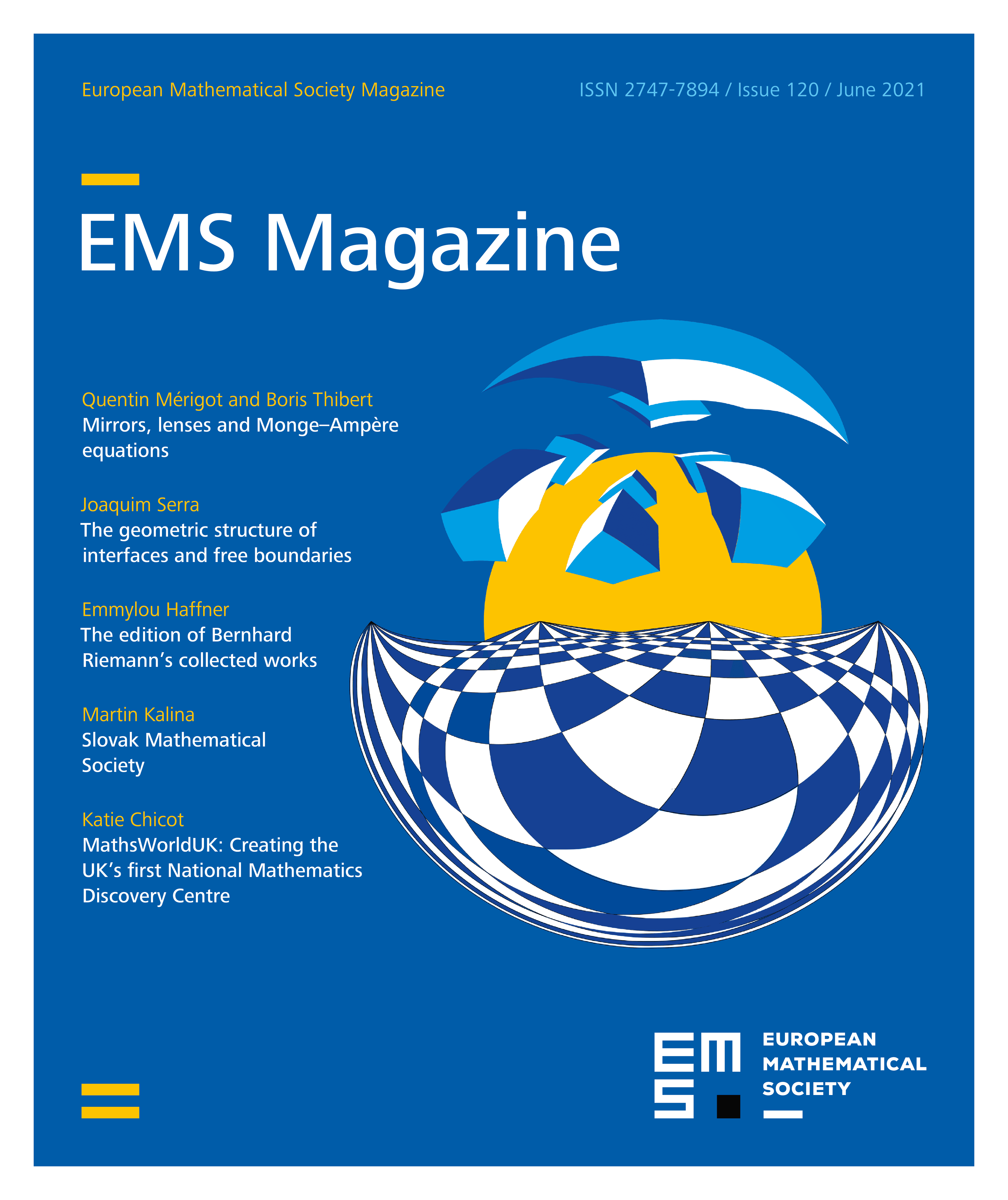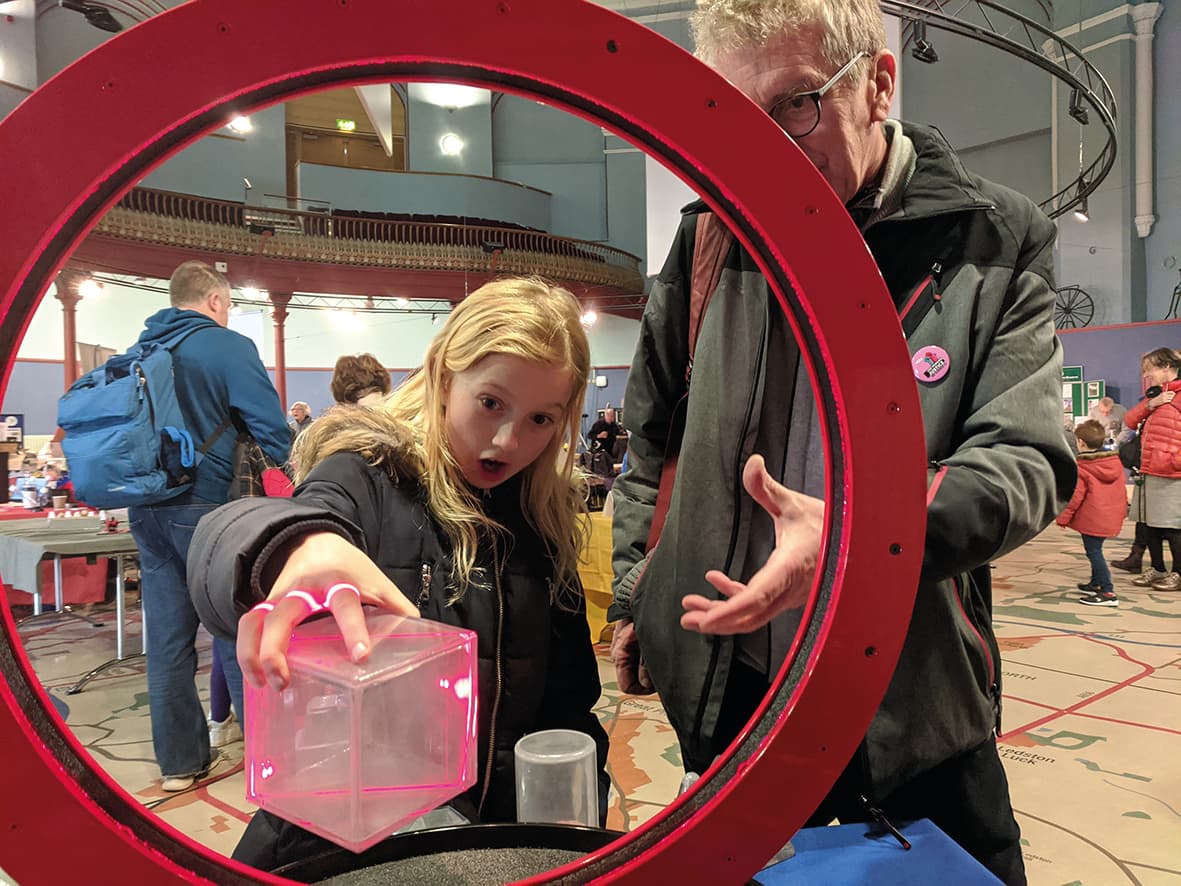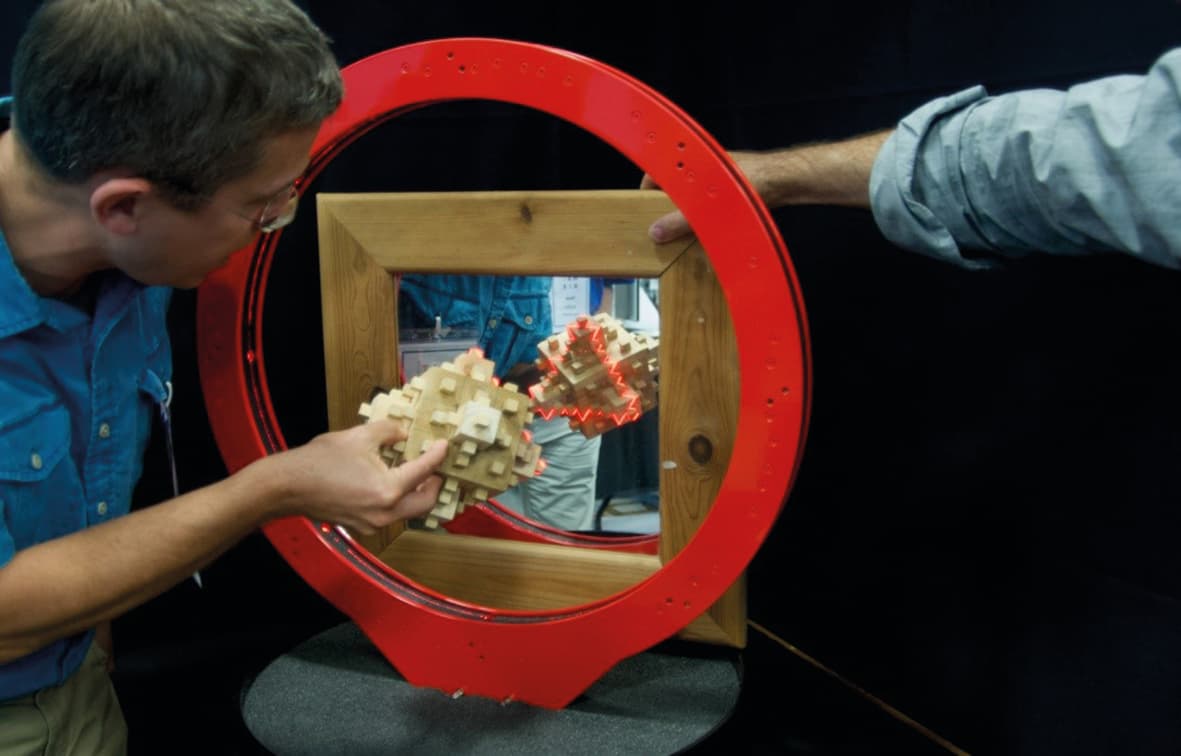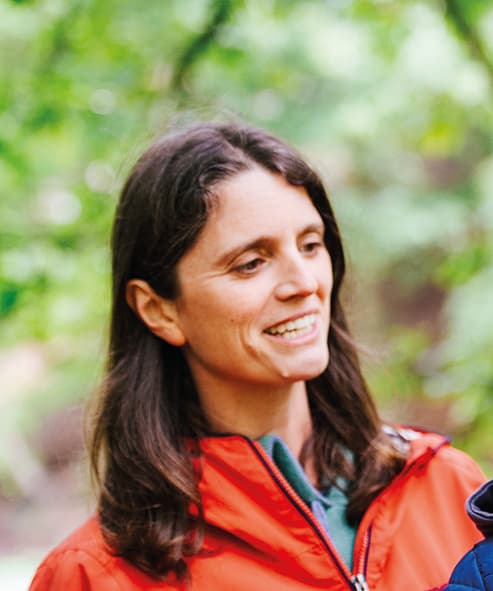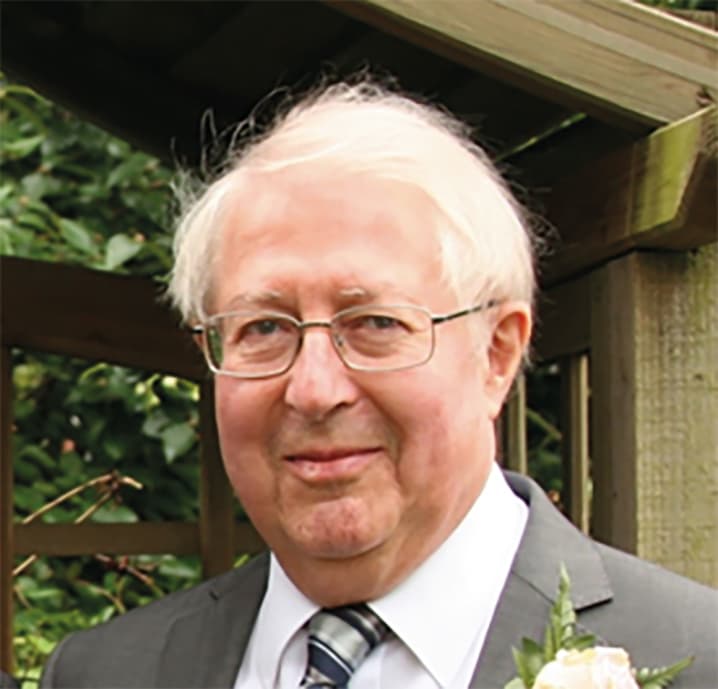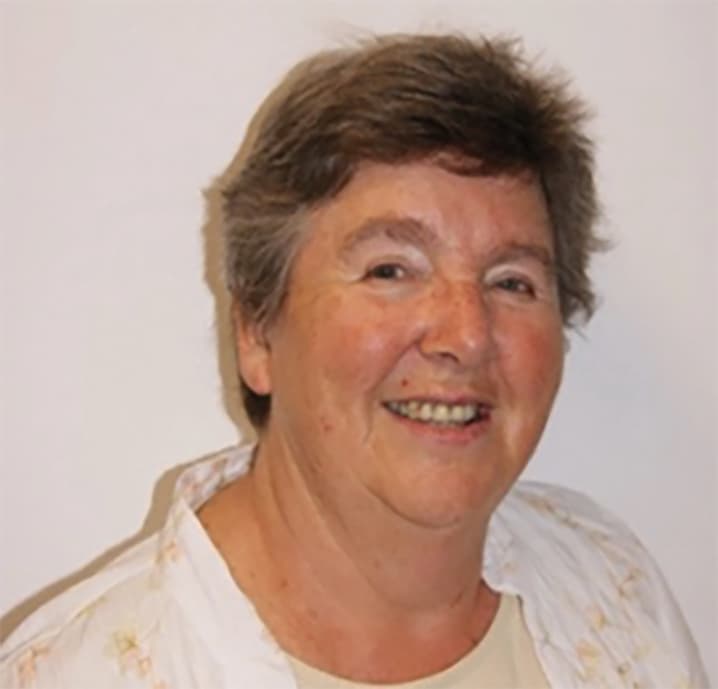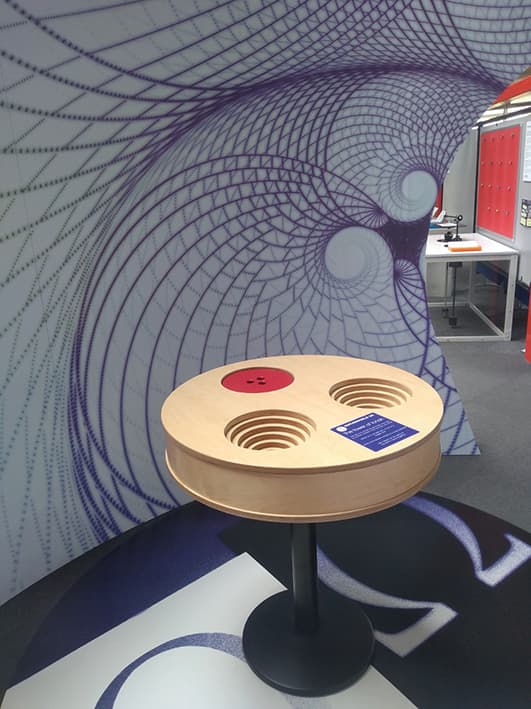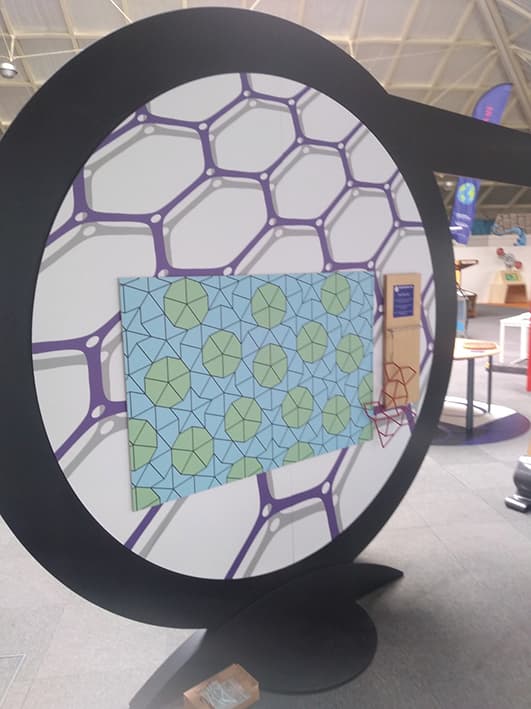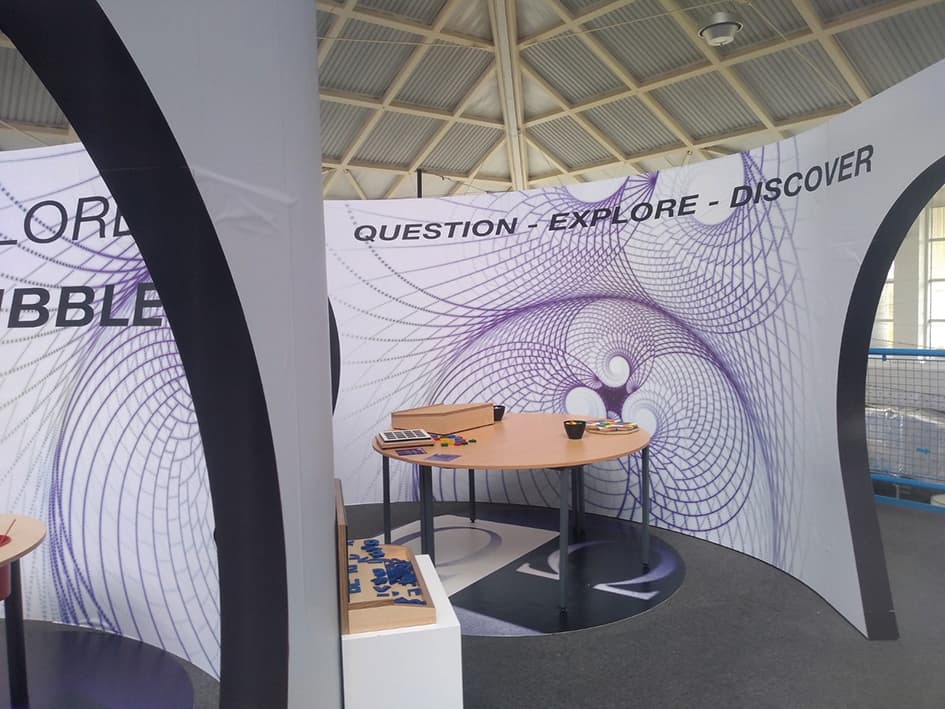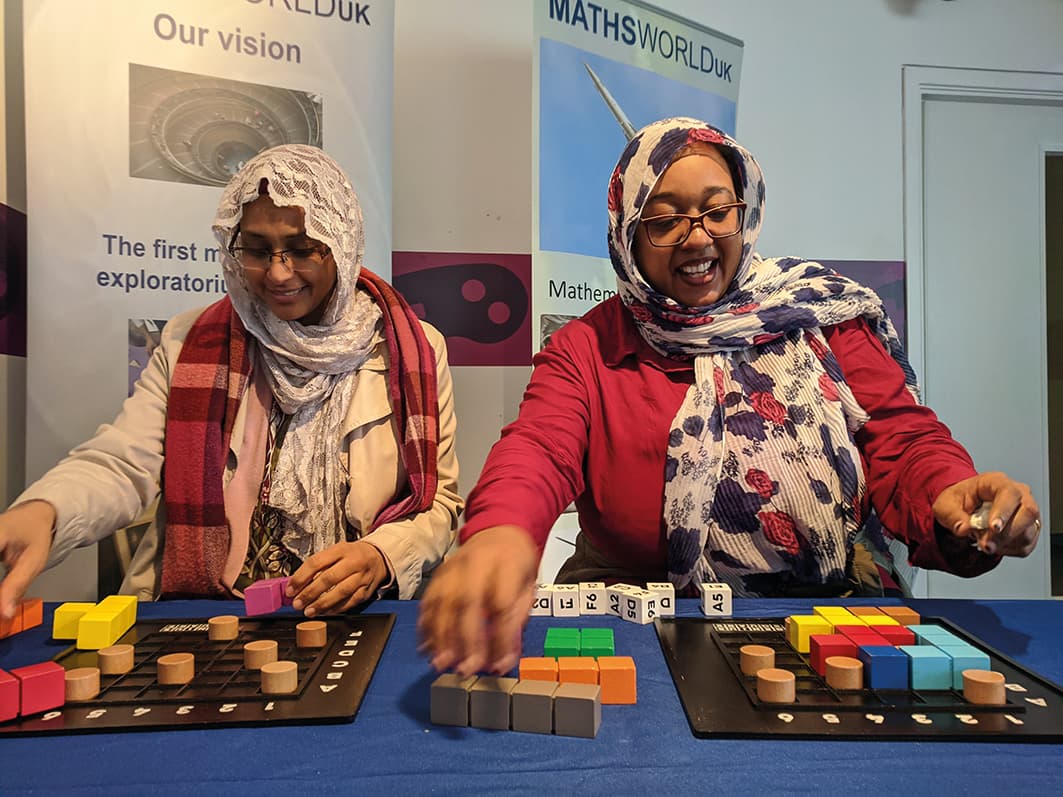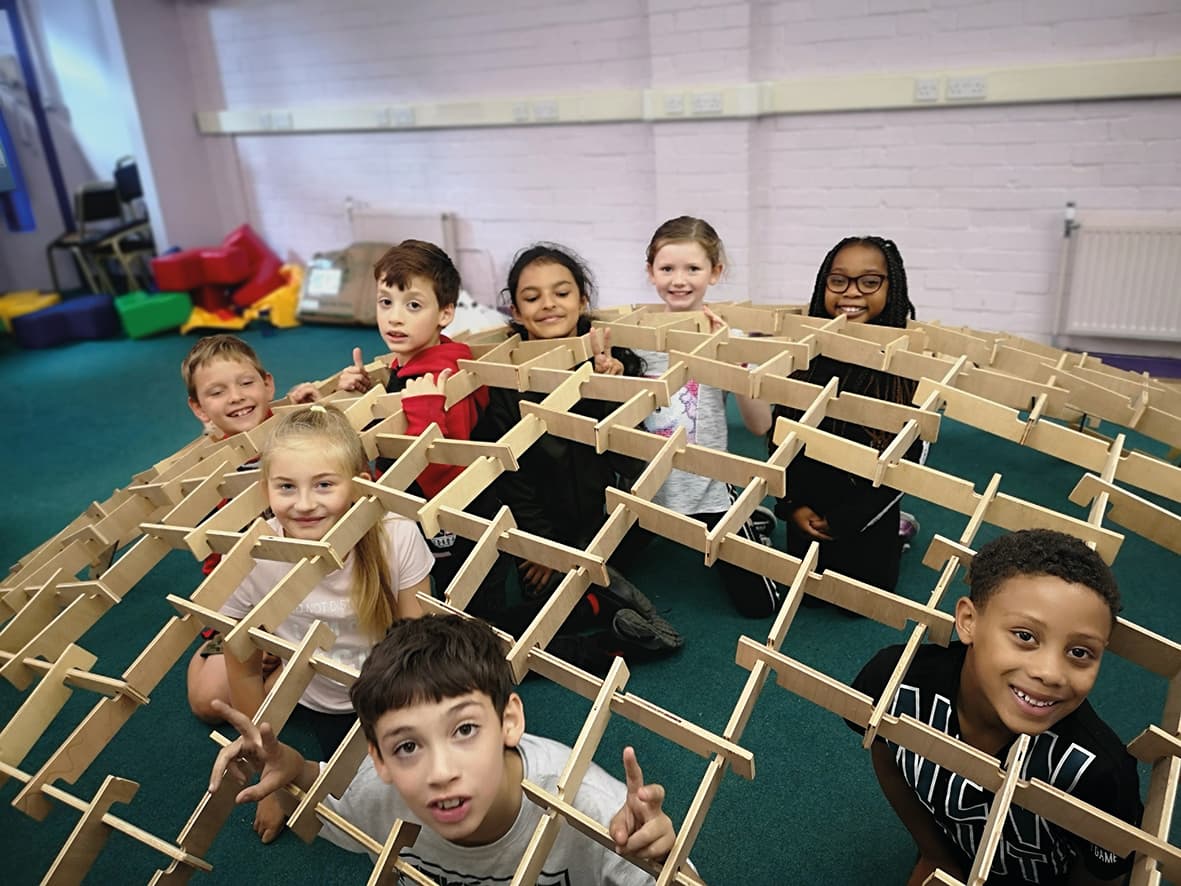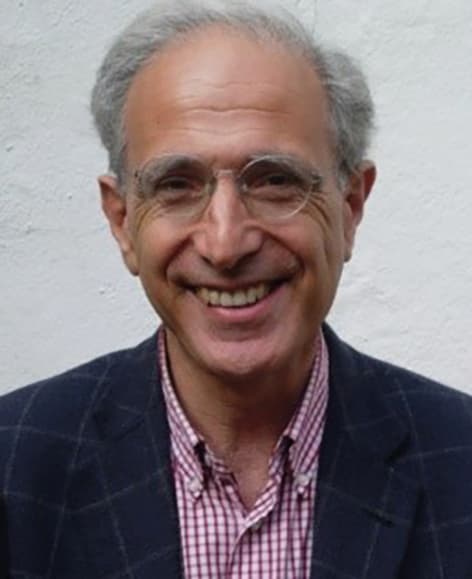MathsWorldUK’s mission is to create a world-class Mathematics Discovery Centre, celebrating the mathematics at the heart of the patterns and structures of our world. A first for the UK, the centre will combine best practice from successful partners across the world with ingenious new ideas and innovative environments developed in the UK. It will be a magnet visitor attraction, drawing visitors from across the UK and from overseas.
We aim to advance the public understanding of mathematics and its applications so that everyone, regardless of age, gender, background and ability, can access and delight in the joy and power of mathematics.
Families interact with the ‘Ring of Fire’ at Leeds Science Festival 2020
©All rights reserved.
MathsWorldUK works with partners across the UK and internationally to spark public excitement, curiosity and engagement with the wonders of maths. We create events and challenges at science fairs, in schools and public settings, as far afield as Greenwich (Greenwich Maths Time), Birmingham (the Big Bang Young Scientists’ and Engineers Fair) and Bradford (International Mathematics Day around the country), aiming to reach a range of groups including those whom might otherwise be excluded from such opportunities.
Our approach is informal and non-threatening, playful and inspiring – inviting children and adults alike to discover the fun of maths and enjoy their own inherent mathematical and problem-solving abilities. As our project continues to develop and we have more space for our exhibits we will offer visitors many hands-on experiences in several different areas of mathematics – geometry, logic, spatial awareness, statistics, mechanical paradoxes and other cheerfully perplexing things, as well as displaying mathematical art and aesthetics.
Our plans have the support of all professional associations in mathematics and mathematics education in the UK and of many Fellows of the Royal Society. Over 40 ambassadors have rallied behind our vision including: Professor Sir David Spiegelhalter; Dr Hannah Fry; Bobby Seagull; Professor Sir Martin Hairer; Tim Harford OBE; and Johnny Ball.
Dr Katie Chicot, CEO, Geoff Wain, Co-Chair, and Prof Margaret Brown, Co-Chair (from left to right)
©All rights reserved.
Why do we need a Mathematics Discovery Centre in the UK?
A Mathematics Discovery Centre plays at least two important roles. It goes without saying that the centre should celebrate the major cultural contribution maths has made throughout human history and how it has helped us understand our world. But there is also an important social dimension.
Mathematics is a life skill which is central to one’s life prospects and wellbeing. This is regarded as obvious in most countries, but it may surprise European readers that it is not widely believed in the UK (despite urgent government reviews and actions). The UK has one of the lowest uptakes of mathematics post-16 of any developed nation and this is partly a reflection cultural attitudes to mathematics, that it is boring, difficult and irrelevant.
No one doubts the necessity of being literate. We need to generate the understanding that a lack of general mathematical awareness has a similarly strong impact on life chances as the abundant evidence shows.
It isn’t only the individual who is affected by a poor culture around mathematics. Society and the economy need a strong base of mathematically qualified citizens. The role of the mathematical sciences is increasing in the workplace. This is due, in part, to increased computing power, big data and greater use of the modelling of complex phenomena in decision making.
A cultural intervention is needed to address the UK’s (particularly England’s) attitudinal relationship to mathematics. Looking at the UK data we can see that a person’s and family’s culture is having the strongest impact on their study choices which is why our work focuses on a family-oriented visitor centre. Nevertheless, Our centre will be of interest to all, including professional users of mathematics, It will be an interesting, challenging and fun place to visit, and a place to return to on many an occasion.
Who’s involved?
MathsWorldUK was established by a few enthusiastic people, encouraged and supported by the mathematics organizations concerned with public engagement with Mathematics. It became a registered charity (no. 1155010) in 2013.
Co-chair, Margaret Brown, OBE, is an Emeritus Professor of Mathematics Education at King’s College London and is a previous Head of the School of Education and member of the Senior Management Committee at King’s. She has served as President of the British Educational Research Association and of the Mathematical Association, and acted as chair of the Joint Mathematical Council of the UK.
For 10 years Margaret chaired the Trustees of the School Mathematics Project, a charity which was concerned with provision of school textbooks and curriculum materials, and with teacher professional development. She was instrumental in setting up the King’s College London Mathematics School for 16–18 year olds. In 2013 Margaret was awarded the prestigious Kavli Medal of the Royal Society for her services to mathematics education.
Co-chair, Geoff Wain, spent 40 years in education, as a teacher and then a teacher trainer. For 24 years he was at the University of Leeds in the Centre for Studies in Science and Mathematics Education, including time as the director of teacher training and as Dean of the Faculty of Education. Geoff was a co-director of the PopMaths Roadshow, a major inter-active exhibition of mathematics which toured 24 cities in the UK and Ireland.
CEO, Katie Chicot, is a Senior Lecturer, Staff tutor in Mathematics at the Open University. Katie has used all sorts of means of communicating mathematics, including co-creating the series Patterns of life for the Open University’s YouTube channel, captaining a team on BBC2’s Beat the Brain, as academic consultant to BBC Radio 4’s More or Less, and the creation of a maths/brain teaser app called Perplex, which is available on the App Store and Google Play.
We have a dedicated executive committee behind the project and a body of volunteers who enable us to carry out our work with the public.
Pre-Covid-19 strategy
Many Mathematics Discovery Centres around the world have grown out of touring exhibitions. These exhibitions demonstrated the huge appetite for physical maths activities, gradually building momentum for a physical discovery centre. To date, there are over 50 such permanent maths centres around the world, but the UK has none. MoMath, the National Museum of Mathematics in New York has an annual footfall of about 200 000 visitors and has changed for the better the perceptions of numerous people about the nature and importance of mathematics. Other centres have had similar success.
MathsWorldUK’s touring exhibition ‘Explore Maths’ installed at Winchester Science Centre
©All rights reserved.
By the start of 2020 we had matched our funding offer of £125,000 (from an anonymous American donor). With this we created our first touring exhibition ‘Explore Maths’. We installed exhibits in readiness for a March 2020 launch in Winchester Science Centre (WSC); we ran a training event with the staff and prepared accompanying materials for teachers and families. In the event, owing to the COVID-19 crisis, Winchester Science Centre closed its doors in March, as did attractions across the country. Lockdown was much longer than all had anticipated, clearly putting the rest of our planned tour under threat.
In response to the effect of the Coronavirus on our activities we have developed new plans to maintain our momentum towards creating the UK’s first Mathematics Discovery Centre.
Activities during Lockdown
During lockdown we wanted to continue our work with the public and offer mathematics engagement which had an element of delight to counteract what the world was experiencing and to support those learning from home. We obviously couldn’t do this in person and we didn’t want to lose any of the momentum we had built up. We created a set of videos that have the general title Maths at Home with MathsWorldUK and feature all the great maths communicators that we know. The videos were directed by Dr James Grime and are for parents, children and anyone with a bent for exploring mathematics to while away the time spent under Covid restrictions, lockdown or otherwise. There is a prominent link to these videos on the Home Page of MathsWorldUK mathsworlduk.com
The quality of the presenters speaks for itself. You can engage in cutting Mobius Strips with Bobby Seagull, or colouring in ‘maps’ or regions with Katie Steckles, or learn about measuring the Earth through looking at the historical contributions of some ancient Greek mathematicians with Johnny Ball, or you can enjoy curious ideas like ‘Diffy Squares’ with Rob Eastaway. You can learn some card trick magic with Zoe Griffiths and experience many more such delights. You can share in the enthusiasm of Nira Chamberlain, the President of the Institute of Mathematics, as he discusses the Gambler’s Ruin Problem. At the time of writing the latest video is an exploration of international number systems with Alex Bellos with Danish Numbers as the starting point (youtu.be/yHcdM2MLuLE).
Alongside the Maths at Home videos we made a series of videos highlighting important mathematics used to study the Coronavirus pandemic. Our own Kit Yates, who is a mathematical biologist and Senior Lecturer in Mathematics at the University of Bath, explains the basic mathematics behind modelling the spread of a deadly virus like the Coronavirus or the Zika virus, and how by looking at members of the population who are Susceptible to the virus, those who are Infectious and those who have Recovered, we can develop a basic mathematical model known as the SIR model. We can then use this model to make predictions about how the numbers in each category compare to actual samples taken from the real world to decide whether the SIR model is a good one or not.
David Spiegelhalter’s video is a wonderful explanation of the concept of a false positive in a diagnostic testing regime. He explains why even the Health Secretary dealing with the Coronavirus pandemic became confused about how to interpret the significance and meaning of a false positive test result. Starting with the current pandemic, David introduces the terms prevalence (the probability of someone having the disease), sensitivity (the probability of someone having the disease and testing positive) and specificity (the probability of someone not having the disease testing negative) and then uses a probability tree to discuss the relative numbers of true positives of a medical test (when the test correctly indicates that you have the disease when you do) and false positives (when the test indicates you have the disease when in fact you do not). At the end of his exposition David also makes reference to Breast Screening tests and Facial Recognition software as used by the police. In each case it is essential to understand how the number of false positives are related to the samples being investigated.
The Government has repeatedly stressed the idea of social distancing and that the safe distance apart between two people is 2 metres. In her interesting video, Aiofe Hunt uses some familiar mathematics, including the Theorem of Pythagoras, to show that designing spaces to hold numbers of people all safely socially distanced from each other is far from obvious and requires much more space than most people realize.
Professor Jen Rogers was previously the Director of Statistical Consultancy Services and an Associate Professor at the University of Oxford She is now the Vice President for Statistical Research and Consultancy at PHASTAR. Jen’s video gives an excellent and reassuring look at vaccine trials and explains how the time for the vaccine development was cut without any reduction in the robust testing procedure or even any reduction in the actually number of man-hours spent developing the vaccine.
Post Covid-19 strategy: MathsCity Leeds
We are now working to establish a pop-up mathematics discovery centre in the centre of Leeds, which we are calling MathsCity. We have the support of Leeds City Council and the Leeds Business Improvement District. We are in talks to secure, for at least one year, a suitable rent-free property in a popular shopping area.
MathsCity will start by housing the original touring exhibition, with its problem-solving theme, and also a Shape and Space Zone. One of the many benefits of this organic way of growing our mission is that we can develop the content for the future centre and test it robustly with the public. In this way the best content will be ready for the future National Mathematics Discovery Centre. We will be changing the content of MathsCity in 9–12 month intervals. The second set of contents are planned to be a Codes and Code-breaking Zone and a Zone on the Mathematics of Pandemics.
It will be difficult to launch a centre under the shadow of the pandemic, but we will be able to learn the lessons of other science discovery centres to run a COVID safe environment. Visitors, including school parties, will be asked to pre-book their timed visits, and we will have gaps between visits to allow for cleaning.
MathsWorldUK at various festivals and community centres
©All rights reserved.
Simon Norton Legacy
Our mission now has the generous support of Michael Norton who has pledged £1.3 million to the mathematics discovery centre in memory of his brother, the mathematician Simon Norton. Part of this funding can be used towards the establishment of MathsCity, but the majority is pledged towards the ultimate centre.
Simon Norton who passed away in February 2019, was a child prodigy in mathematics. He represented Britain at the International Mathematical Olympiads three times in the 1960s, scoring the top grade each time, once with 100 %, another time with 99 %, and winning a special prize for the elegance of his solutions.
He did his PhD under John Conway in Cambridge and with John Conway he produced the seminal Atlas of Finite Groups.
Simon became the world expert on the Monster Group and its connection to Modular Functions and with John Conway coined the term Monstrous Moonshine. “I can explain what Monstrous Moonshine is in one sentence,” said Simon. “It is the voice of God.”
Simon was fascinated by the huge number of symmetries associated with the Monster Group. This group has order of roughly , that is the number of elements in the set that defines the group.
The Legacy left by Simon Norton is administered by his brother, Michael Norton, and a group of Trustees. Michael Norton is now taking an active role in helping MathsWorldUK to move towards its ultimate goal.
Michael is the Director of the Centre for Innovation in Voluntary Action (CIVA). Michael has decades of experience in developing major innovative projects each of which has the theme of social justice. We thank him for his efforts so far and know that through his generosity we are making good progress to our ultimate goal.
Michael Norton
©All rights reserved.
The UK’s first National Mathematics Discovery Centre
The UK is almost alone in not having an informal maths space in which to meet, explore and admire mathematical achievement. We would like the entire maths community to be behind this project and to be involved in shaping its content and direction. We have been fortunate to have guidance from European Mathematics Discovery Centres, most notably Mathematikum in Giessen and MMACA in Barcelona. We would welcome further involvement from supporters in Europe and elsewhere.
If you would like to support to our mission, then visit www.mathsworlduk.com/join-us/ and see the ways you can get involved. Or you can email our CEO on katie.chicot@mathsworlduk.com. We look forward to hearing from you.
MathsWorldUK is registered in the UK as a charity (number 1155010) and as a company (number 837040).
Cite this article
Katie Chicot, MathsWorldUK: Creating the UK’s first National Mathematics Discovery Centre. Eur. Math. Soc. Mag. 120 (2021), pp. 50–54
DOI 10.4171/MAG/31